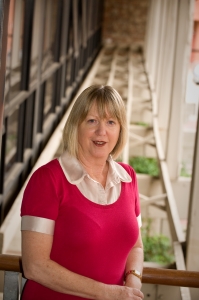Standing beside someone and going forward together
Research news
Associate Professor Karen Stagnitti has a nice way of describing the special relationship that exists between mentor and mentee that is part of Deakin University’s highly regarded Developing Research Leaders program.
“It is all about standing beside someone and going forward together,” she says.
Right now Associate Professor Stagnitti is standing beside Genevieve Pepin, her second mentee in this program instituted at Deakin by Dr Maree Gladwin.
The aim of the program is to assist mid-career researchers (MCRs) to improve their research performance, support and increase networking and cross-disciplinary collaborations and embed quality research mentoring in Deakin’s research culture.
“I am very pleased that Karen agreed to take on a second mentee,” Dr Gladwin said.
“It is a sign that people are getting value out of the program, whether they are mentees or mentors.”
Associate Professor Stagnitti believes that Dr Gladwin has developed a highly effective program.
“There is lots of support; she puts a structure around the program which gives you a bit of autonomy and breathing space,” she said.
“In fact, it is so good next time, rather than being a mentor again, I think I might like to come back next time as a mentee!”
Genevieve Pepin comes to Deakin from the Laval University in Quebec.
Her research interests focus on occupational therapy practice in mental health, especially on eating disorders and on the different types of interventions available.
She is currently leading an innovative research project in which the impact of a new occupational therapy intervention process is compared with traditional psychiatric treatment of severe depression.
“Genevieve asked me to be her mentor and it is something that I am really pleased to do because as well as helping the mentee, it is good for me too,” Associate Professor Stagnitti said.
“It makes me stop to think about my own research and to question how I got to where I am now, and where do I want to go.
“It’s also a bit scary because you think, ‘hey I can’t help this person at all’.
“Genevieve is from Canada and has internationally recognised research in eating disorders.
“She has been invited to London to talk to an international group involved in eating disorders. So she is well established in that regard.”
Getting to know the Australian research funding systems has been one area where Associate Professor Stagnitti has been able to assist Genevieve.
“It is important for me to know how things work in Australia, to know about the agencies and how to get funding,” she said.
“Because at the moment I am on a temporary visa, I am not eligible to apply for Australian Research Council and National Health and Medical Research Council grants, I have to look elsewhere.
“With other colleagues I have applied for grants to the Butterfly Foundation and to Rotary and while we have not yet been successful, we have received very good feedback that will help us with future applications.
“One of the good things about the mentor/mentee program is that we can discuss this feedback there, so from that point of view it has been really useful to me.
“As for Karen, I can’t believe that she thinks that I am so qualified, because she really is amazing.
“She is known throughout the world, she doesn’t take herself too seriously, which I really admire about her, but also she is very generous with her knowledge, particularly about publishing.
“That is another area in which she has been very helpful to me.”
Associate Professor Stagnitti’s research is primarily concerned with play ability of children under 10 years of age in a number of main areas:
- The continuing development of a norm referenced play assessment: The Child-Initiated Pretend Play Assessment (ChIPPA)
- The relationship between play and literacy ability in young children
- The use of the ChIPPA with different clinical groups of children
- The refinement of an intervention program that builds up a child’s play skills
The research has included the creation of a developmental checklist of play ability and the development of play intervention program called the “Learn to Play” program.
This is a dynamic interactive programme to develop imaginative play skills which are important to the development of language, social and cognitive skills.
Associate Professor Stagnitti has conducted training workshops on the program in Australia and overseas, having just returned from a trip to Finland.
Standing beside someone and going forward together is truly international!
Share this story
 Associate Professor Karen Stagnitti
Associate Professor Karen Stagnitti
